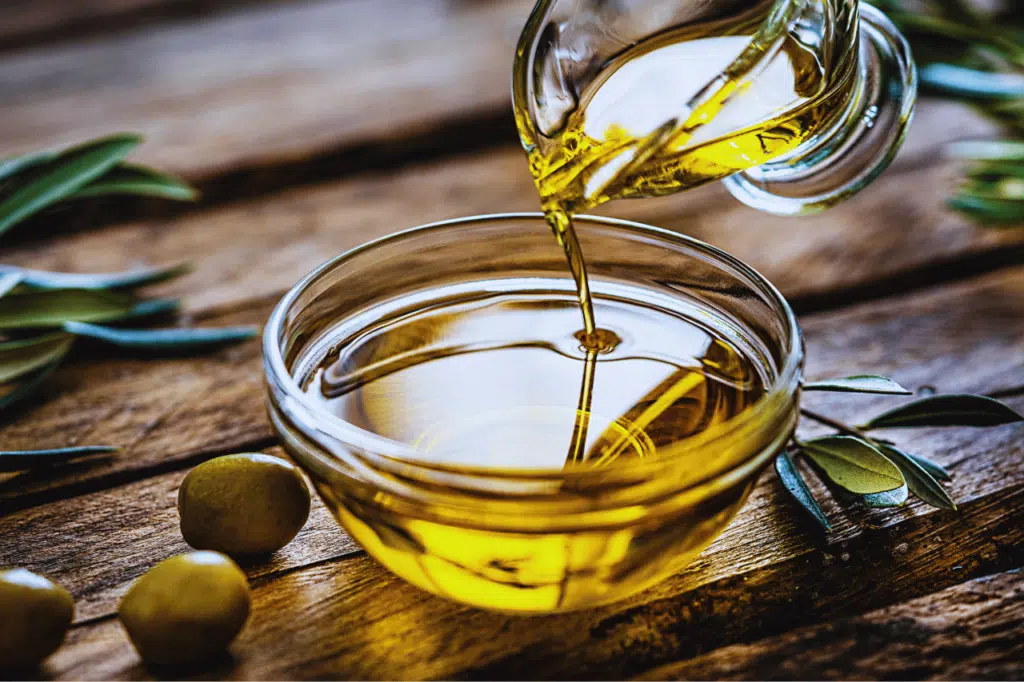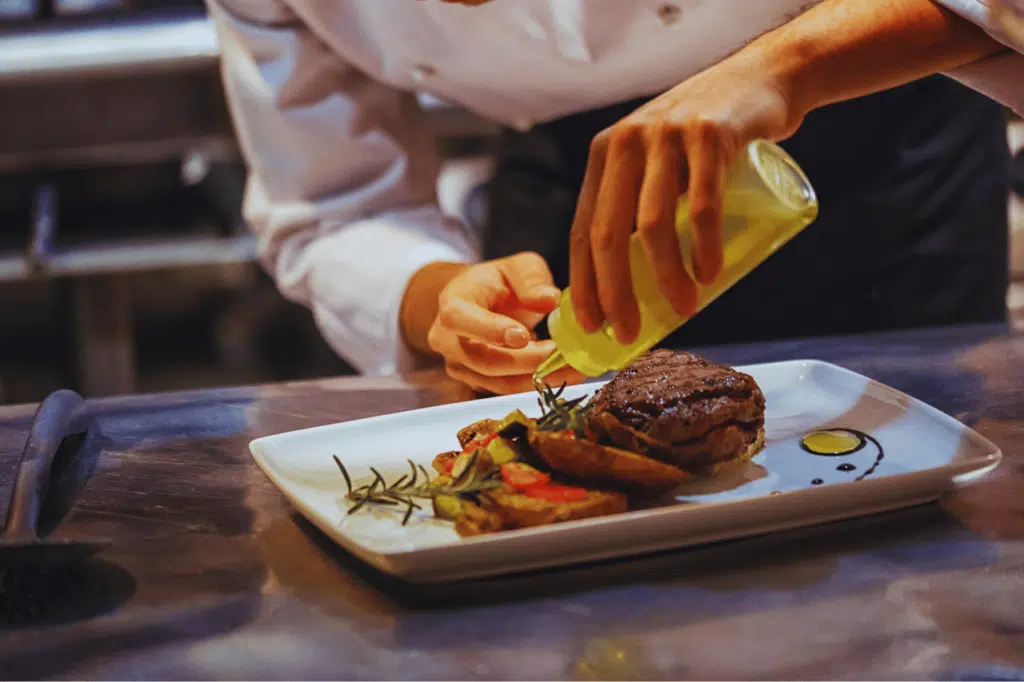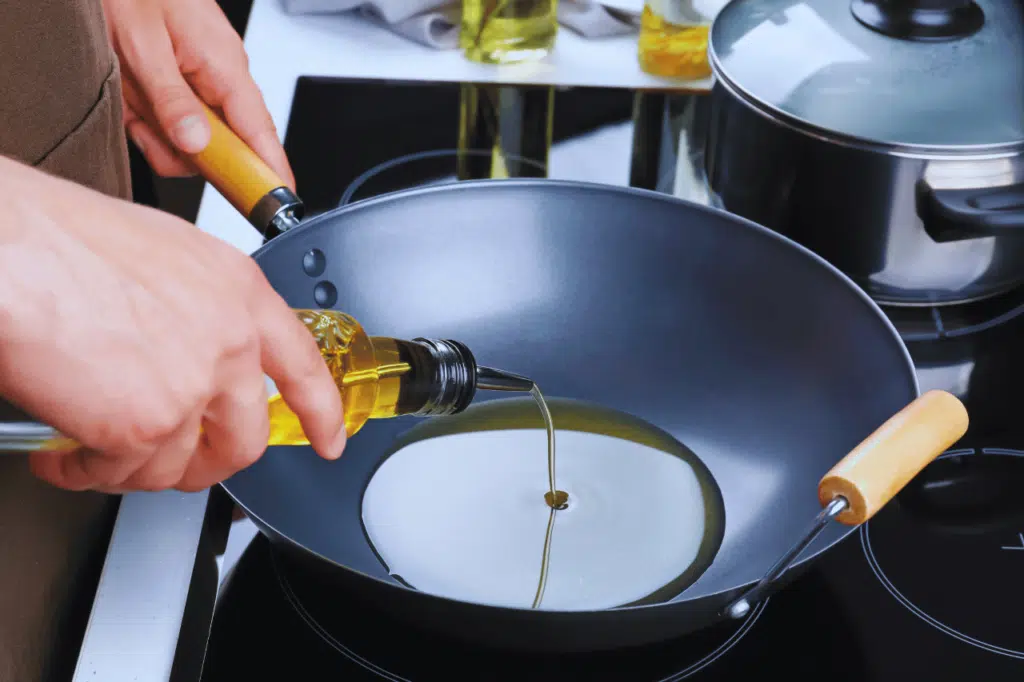Which oil reigns supreme? Rapeseed oil vs olive oil. When it comes to cooking, frying, and drizzling over salads, choosing the right oil can make all the difference. We dive into the benefits of rapeseed and olive oil, comparing their health impacts, flavour, and versatility. We spoke to some of our customers, chefs from restaurants and pubs that we collect cooking oil from to find out which oil truly deserves a spot in your kitchen!
Which Is Best, Rapeseed Oil Or Olive Oil?
Rapeseed oil is the best overall. Its versatility shines through, making it perfect for shallow frying, deep frying, marinating, and even drizzling. With a pleasant flavour and a high smoke point, rapeseed oil excels in a wide range of culinary applications, securing its place as the top choice in the oil battle. Although if its purely health benefits you are interested in, they are both good compared with some other edible oils but olive oil has been shown to have cardioprotective impact as this study on rapeseed oil and olive oil has shown
Rapeseed Oil – A quick overview
Rapeseed oil, often referred to as canola oil in North America, is a popular cooking oil derived from the seeds of the rapeseed plant. This versatile oil is known for its light flavour, making it an excellent choice for various culinary applications ranging from frying to salad dressings and even deep-frying.
Rich in omega-3 and omega-6 fatty acids, rapeseed oil also offers numerous health benefits, including support for heart health and a balanced nutritional profile. Sourced locally from British farmers, it contributes to sustainability in food production while providing a healthy option for cooking and baking. Many consider rapeseed oil healthier due to its balanced nutritional profile and low saturated fat content.


How is Rapeseed Oil Made?
Rapeseed oilis made through a meticulous process that typically involves harvesting, cleaning, and pressing the seeds of the rapeseed plant to extract the oil, often utilising cold-pressing techniques for higher quality.
The journey of producing rapeseed oil begins with the careful cultivation of rapeseed, followed by the harvesting of mature plants when the seeds reach optimal ripeness. Once harvested, the seeds undergo a thorough cleaning process to remove any impurities or foreign materials, ensuring only the purest seeds are used.
- After cleaning, the seeds are prepared for extraction.
- Cold-pressing is favoured for its ability to retain nutrients and provide a richer flavour.
In contrast to conventional methods, where heat and solvents may compromise quality, organic rapeseed oil offers a cleaner profile by eliminating the use of synthetic pesticides. Consumers can enjoy a variety of benefits from this oil, including its heart-healthy fats and favourable omega-3 to omega-6 ratio, making it a versatile choice for culinary applications.
What are the Nutritional Benefits of Rapeseed Oil?
Rapeseed oil is acclaimed for its nutritional benefits, as it boasts a favourable balance of omega-3 and omega-6 fatty acids, making it an excellent source of healthy fats that promote heart health and overall wellness. Its low saturated fats content makes it particularly beneficial for cardiovascular health.
Plus its impressive fatty acid profile, rapeseed oil is rich in vitamin E, a potent antioxidant that plays a crucial role in protecting cells from oxidative stress. This oil is also predominantly unsaturated, which is beneficial in maintaining healthy cholesterol levels and reducing the risk of heart disease.
- Omega-3 fatty acids are known to reduce inflammation.
- Omega-6 fatty acids help in regulating metabolism.
- Vitamin E protects against diseases.
Olive Oil -A quick overview
Olive oils, including extra virgin and pure olive oils, are renowned for their health benefits, making them a favoured cooking oil across the globe. Its cardiovascular benefits have been widely documented, including in publications such as the European Journal of Lipid Science and Technology.
Sourced from the fruit of the olive tree, this oil is renowned for its high content of monounsaturated fats and antioxidants, which together promote heart health and reduce the risk of chronic diseases. It is also a key component in cooking for wellness, offering substantial cooking benefits due to its nutritional advantages.
Often utilised in various cooking methods, including sautéing, drizzling over salads, or as an ingredient in dressings, olive oil is versatile and essential in many culinary creations. It is a preferred choice in many healthy cooking techniques and can even be used in waste cooking oil recycling programs.
How is Olive Oil Made?
Olive oil is produced through a process that involves harvesting ripe olives, which are then washed, crushed, and pressed to extract the oil, with extra virgin olive oil being derived from the first cold pressing for superior quality.
The journey of olive oil begins in the sun-drenched orchards, where careful harvesting captures only the ripest fruits. After collection, the olives are thoroughly washed to remove impurities, ensuring purity in the final product.
Next, they undergo crushing, where traditional stone mills or modern steel grinders break them down into a paste. This mixture is then gently pressed to release the oil.
What are the Nutritional Benefits of Olive Oil?
Olive oil is well-regarded for its health benefits, rich in monounsaturated fats and antioxidants, contributing to heart health and providing anti-inflammatory properties that can help reduce the risk of chronic diseases.
Plus these key advantages, it also plays a remarkable role in enhancing your overall well-being. The unsaturated fats found in olive oil help to lower bad cholesterol levels, ensuring a healthier heart. These nutritious fats are essential for the absorption of fat-soluble vitamins, which are vital for maintaining a robust immune system.
Key nutritional advantages include:
- Healthy Fats: Monounsaturated fats promote heart health.
- Antioxidants: Combat oxidative stress and inflammation.
- Anti-inflammatory Properties: May reduce the likelihood of chronic diseases.
When included in your diet, olive oil not only enhances flavours but also serves as an essential tool for promoting cardiovascular health and longevity.


Comparison of Canola Oil and Olive Oil
When comparing rapeseed oil and olive oil, it becomes essential to consider factors such as nutritional value, health benefits, flavour profiles, and suitability for various cooking methods, as each oil offers unique advantages.
When comparing rapeseed oil and olive oil, it becomes essential to consider factors such as nutritional value, health benefits, flavour profiles, and suitability for various cooking methods, as each oil offers unique advantages.
Flavour
The flavour of rapeseed oil is typically mild and neutral, allowing it to complement a variety of dishes, while olive oil presents a distinct, robust flavour that can enhance Mediterranean dishes and salads. The balanced ratio of omega-3 to omega-6 fatty acids in rapeseed oil further adds to its culinary versatility.
This versatility means that rapeseed oil can be seamlessly integrated into baking, sautéing, and even as a base for dressings. In contrast, the rich aroma and taste of olive oil elevate dishes like pasta, grilled vegetables, and marinades, making it an essential component in Mediterranean cooking. This comparison of cooking benefits highlights how each oil can be best used in culinary creations.
- For Rapeseed Oil: Excellent in cakes, pancakes, and stir-fries.
- For Olive Oil: Perfect for drizzling over fresh bruschetta or seasoning a Greek salad.
By understanding the unique profiles of these oils, one can make informed culinary choices that enhance flavours and create delightful dishes.
Smoke Point
Rapeseed oil generally has a higher smoke point than olive oil, making it suitable for high-heat cooking methods such as deep-frying, while olive oil is better suited for medium-heat applications and finishing dishes. This distinction is crucial for those aiming for healthy cooking without compromising on flavor and nutritional integrity.
- High-heat cooking: For techniques such as frying and searing, oils with smoke points above 200°C are ideal.
- Medium-heat cooking: Those looking to sauté or gently cook can benefit from oils with moderate smoke points, which include olive oil.
- Low-heat cooking: Delicate oils such as flaxseed or walnut oil, which possess lower smoke points, are perfect for dressings and drizzling.
Nutritional Comparison
- Rapeseed oil contains the least saturated fat of all oils, making it a good choice for heart health.
- Olive oil is high in monounsaturated fatty acids, which help lower LDL (bad) cholesterol and raise HDL (good) cholesterol.
- Rapeseed oil has a higher proportion of polyunsaturated fat than olive oil, which helps to lower LDL cholesterol.
- Rapeseed oil contains more vitamin E than olive oil, a powerful antioxidant.
In terms of nutritional value, rapeseed oil is rich in omega-3 fatty acids and vitamin E, while olive oil is celebrated for its monounsaturated fats and antioxidants, each providing distinct health benefits. Sunflower oil is another popular choice but has different nutritional profiles compared to rapeseed oil and olive oil.
When one explores the nutritional profiles of these oils, it becomes evident that both offer unique advantages to health. Their balanced ratio of healthy fats and low saturated fat content makes them excellent choices for reducing the risk of cardiovascular disease and promoting overall wellness.
- Rapeseed oil boasts a high content of omega-3 fatty acids, which support heart health and may reduce inflammation. Its anti-inflammatory properties are also beneficial for those suffering from inflammatory arthritis.
- It is an excellent source of vitamin E, a powerful antioxidant that helps combat oxidative stress in the body, protecting against damage from free radicals.
Cooking Uses
Both rapeseed oil and olive oil offer culinary versatility, with rapeseed oil being ideal for baking and frying, while olive oil shines in dressings, marinades, and sautéing vegetables, making them essential staples in any kitchen. When discussing cooking oils comparison, these two are frequently highlighted for their unique properties and benefits.
These oils can be used in numerous recipes, such as:
- Rapeseed oil works wonderfully in fluffy cakes and is perfect for frying crispy fish fillets, lending a light taste that complements the ingredients without overwhelming them.
- Olive oil, on the other hand, is excellent for drizzling over fresh salads, incorporating into pasta sauces, or even for roasting root vegetables, creating a delightful golden-brown finish.
By understanding how to use each oil effectively, cooks can elevate their culinary creations effortlessly.


Which Oil is Best for Cooking?
Determining which oil is best for cooking depends on several factors, including the cooking methods employed, dietary needs, and the overall health benefits desired from the oil used in culinary creations. Renowned chefs like Kumud Gandhi and Victoria Glass often recommend considering these factors
when selecting oils.
Cooking and Smoke Point
- Rapeseed oil has a higher smoke point than olive oil, making it suitable for high-heat cooking.
- Olive oil is better suited for low-heat cooking or dressings due to its lower smoke point.
- Cold pressed rapeseed oil is ideal for roasting and frying due to its high smoke point.
- Rapeseed oil is a more versatile oil than olive oil, suitable for various cooking methods.
High Heat Cooking
For high-heat cooking methods such as deep-frying, rapeseed oil is often preferred due to its higher smoke point, making it a safer choice than olive oil, which is more suitable for lower temperatures.
When selecting oils for intense cooking, understanding smoke points becomes crucial. Oils with higher smoke points, like rapeseed, safflower, and avocado oil, can withstand the elevated temperatures without breaking down and developing harmful compounds.
In contrast, oils like olive and butter, which have lower smoke points, risk burning, leading to unpleasant flavours and potential health hazards. The transformation of these oils can also release free radicals, which are detrimental to health.
Therefore, using oils that remain stable during high-heat cooking not only preserves taste but also contributes positively to one’s culinary health.
Low Heat Cooking
For low-heat cooking methods, olive oil is an excellent choice as it retains its flavour and nutritional benefits, making it ideal for sautéing vegetables and drizzling over finished dishes.
The use of olive oil not only enhances the overall taste profile of meals but also contributes significantly to health-focused cooking techniques.
Rich in monounsaturated fats, this oil promotes heart health while aiding in the absorption of fat-soluble vitamins. When utilising olive oil in dishes, one can unlock an array of flavours that elevate simple ingredients into gourmet experiences. Studies suggest that incorporating olive oil into your daily regimen may reduce inflammation and support metabolic health.
- Flavour enhancement: adds depth to various cuisines
- Health benefits: supports cardiovascular health
- Versatile usage: perfect for dressings, marinades, and more
This makes it not just a cooking staple but a valuable asset in a holistic approach to healthful eating.
Dressings and Dips
In terms of dressings and dips, olive oil excels due to its rich flavour profile, while rapeseed oil can serve as a neutral base for those looking for a lighter taste.
This dynamic duo of oils presents an impressive culinary versatility that elevates everyday meals.
- Olive oil adds depth and a fruity kick, making it exceptional in Mediterranean-inspired recipes, such as tangy vinaigrettes or robust dips like hummus.
- In contrast, rapeseed oil shines as an unobtrusive option, perfect for those who prefer a more balanced flavour, allowing other ingredients to take centre stage.
- Utilising both oils allows chefs and home cooks alike to tailor their dressings and dips, creating a uniquely personal twist on classic recipes.
By understanding the distinct characteristics of these oils, one can effortlessly enhance various dishes, turning simple ingredients into culinary masterpieces.
Environmental Impact of Rapeseed Oil and Olive Oil Production
The production of rapeseed oil and olive oil carries significant environmental considerations, including land and water use, transportation emissions, and the sustainability of farming practices that directly impact local ecosystems. In the UK, efforts are being made to promote these sustainable practices, with British farmers playing a crucial role in adopting eco-friendly methods.
Land and Water Usage
Land and water usage are critical factors in the environmental impact of both rapeseed oil and olive oil production, as efficient farming practices can help conserve these vital resources.
Understanding the specific requirements for these crops is essential to ensure sustainable agriculture. For rapeseed, optimal land should be well-drained and rich in nutrients to support healthy growth. Additionally, water conservation methods, such as drip irrigation, can make a significant difference in productivity while reducing water wastage.
Pesticide Use
The use of pesticides in oilseed rape oil and olive oil production can significantly affect environmental health, making organic farming practices an important consideration for sustainable agriculture. Companies like Bio UK Fuels are leading the way in promoting these practices.
In recent years, the consequences of chemical applications have sparked widespread concern about their impact on biodiversity and soil health.
Organic farming offers a promising alternative by minimising chemical usage, thereby promoting a more harmonious balance within ecosystems.
Carbon Footprint
The carbon footprint associated with the production and transportation of rapeseed oil and olive oil is an essential aspect of their environmental impact, influencing consumer choices towards more sustainable options.
Understanding the intricacies of these oils can help individuals make more informed decisions. For instance, when comparing their environmental impacts, one must consider various factors such as cultivation methods, land use, and the resources required for distribution. This evaluation is crucial in a comprehensive cooking oils comparison.
- Rapeseed oil, often associated with lower emissions due to its high yield per acre, has proven to be efficient.
- On the other hand, olive oil’s traditional farming practices sometimes lead to higher carbon footprints.
Both oils can be recycled for Biodiesel production, with rapeseed oil being more commonly used as its used more in deep frying resulting in higher volumes of waste cooking oil. Bio UK Fuels recycles cooking oil from locations across the UK


Frequently Asked Questions
What is the difference between rapeseed oil and olive oil?
Rapeseed oil and olive oil are two commonly used cooking oils that have distinct differences. Rapeseed oil is extracted from the seeds of the rapeseed plant, while olive oil is extracted from the fruit of the olive tree. They also have different flavour profiles and nutritional compositions.
Which oil is healthier, rapeseed oil or olive oil?
Both rapeseed oil and olive oil have their own health benefits. Rapeseed oil, a type of vegetable oil, is high in monounsaturated and polyunsaturated fats, which can help reduce cholesterol levels. Olive oil is high in monounsaturated fats and rich in antioxidants, which can help reduce the risk of heart disease. Ultimately, the healthiest choice depends on your individual dietary needs, as highlighted in Healthy Food guides.
Can rapeseed oil be used as a substitute for olive oil?
Yes, rapeseed oil can be used as a substitute for olive oil in most cooking and baking recipes. However, keep in mind that they have different flavour profiles, so the end result may taste slightly different. Additionally, rapeseed oil has a higher smoke point, making it a better choice for high-heat cooking methods.
Which oil is better for deep frying, rapeseed oil or olive oil?
In terms of smoke point, rapeseed oil is the better choice for deep frying as it has a higher smoke point of 400°F compared to olive oil’s 350°F. This means it can withstand higher temperatures without burning. However, olive oil has a more distinct flavour that may add to the taste of the fried food.
Is rapeseed oil more expensive than olive oil?
The price of rapeseed oil and olive oil can vary depending on the brand and quality. Generally, olive oil tends to be more expensive due to the longer and more labour-intensive process of extracting the oil from the olives. However, both oils can be found at a range of prices depending on the specific type and brand.
Which oil is better for salad dressings, rapeseed oil or olive oil?
Both rapeseed oil and olive oil can be used in salad dressings, but olive oil is more commonly used due to its distinct flavour and nutritional benefits. However, some people prefer the milder flavour of rapeseed oil in their salad dressings. Ultimately, the choice depends on personal taste and dietary preferences.
About Martin Simpkins
Martin Simpkins is a dedicated business professional with hands-on experience in operations, fuel supply management, and client service within the UK energy sector. Through his role at Bio UK Fuels, he has been involved in daily business operations, customer coordination, and ensuring smooth delivery of fuel services to commercial clients.
Martin’s work reflects strong organisational skills, a practical approach to problem-solving, and a focus on maintaining reliable business relationships. Colleagues and partners know him for his steady communication style and his commitment to keeping projects running efficiently.


